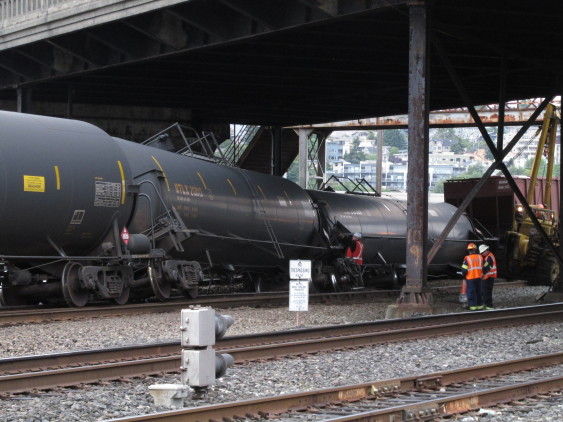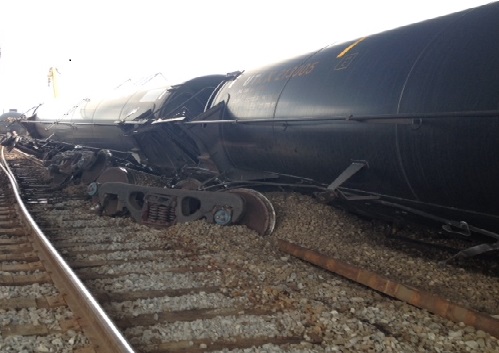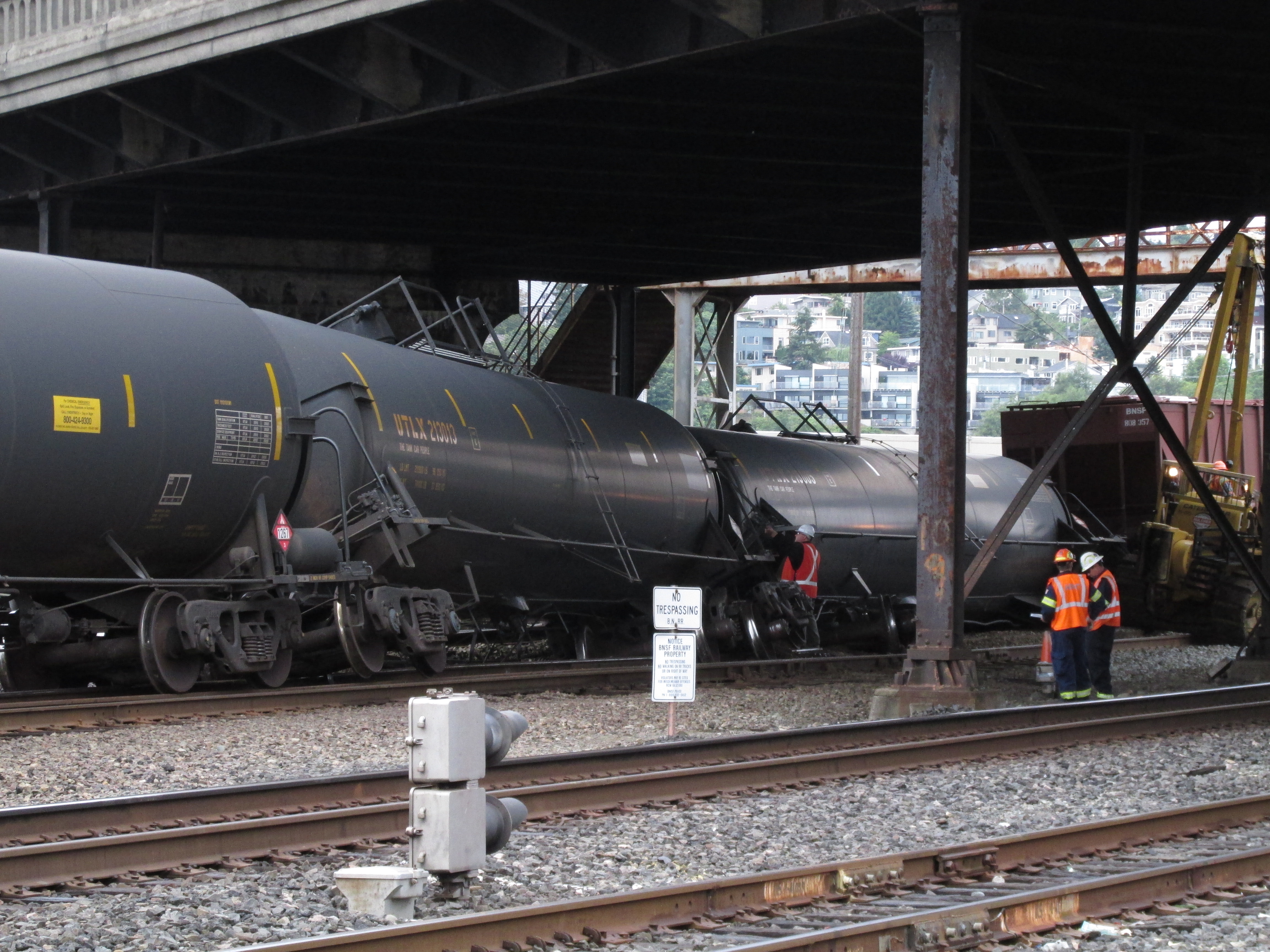Editor’s Note 7/24/15: One year ago today, a train carrying crude oil derailed in Seattle. Luckily, no damage occurred, but this close call is a reminder that dangerous oil trains come close to home. An explosion could result in a terrible loss of human life and take millions of dollars to clean up.
The first commuters were just beginning to trickle over the Magnolia Bridge near downtown Seattle as the short summer night was warming to gray. Probably none of them realized just how narrowly they escaped disaster that morning.
Below them, a BNSF locomotive pulling 97 tank cars—each laden with at least 27,000 gallons of crude oil from the Bakken formation of North Dakota—came to a halt under the Magnolia Bridge in Seattle. Three cars had derailed. It was July 24th of 2014.
The time was 1:50 AM.
What happened next—or more precisely, what didn’t happen—has come to define what appears to be a pattern of secrecy and poor communication by BNSF, troubling habits that put lives in the Northwest at risk. For example, three years earlier when a BNSF hazardous substance train derailed on a Puget Sound beach near Tacoma, the railroad was unresponsive to emergency officials for nearly four hours. Even then, communication lines were so poor that the railroad’s subsequent actions put the first responding firefighters directly into harm’s way for no purpose.
Early Morning: BNSF Downplays the Risk
Within five minutes of the Magnolia Bridge derailment, the BNSF response team was on site, according to the company spokesman. (The derailment happened less than a hundred yards from the railway’s Interbay Railyard.) The team determined, apparently without consulting public authorities, that there was no safety risk and that they did not need assistance.
By 3:11 AM, BNSF dispatch had notified the Washington State Department of Ecology, informing state officials there were no hazardous materials involved, even though crude oil is unambiguously considered a hazardous material. BNSF also said there was no risk to life and safety, and there was no potential for either. This despite the risk of oil spill from the notoriously leak-prone tank cars on the train, and despite the fact that Bakken crude has a noted tendency to explode catastrophically.

Oil train derailment in Magnolia neighborhood of Seattle, July 24, 2014 (2) by Hayley Farless (WEC intern, summer 2014) (Used with permission.)
Seattle Awakens, Does Not Like What it Sees
By 5:44 AM, the Seattle Times had published a story about the incident, though some reports suggest neither local authorities nor the Department of Ecology were aware that an oil train had derailed. Sometime during the six o’clock hour, the City of Seattle’s Director of Emergency Management became aware of the incident, apparently after hearing a news broadcast, rather than receiving an emergency management notification. By 6:54 AM the Seattle Fire Department learned of the incident via a 911 call placed from a nearby business, but emergency responders had still heard nothing directly from BNSF.
The Fire Department, clearly concerned, deployed 19 firefighters, including a hazardous materials team.
At 7:25 am, more than five hours after the incident, the Department of Ecology finally learned that the derailed cars reported hours earlier did, in fact, contain hazardous material—a particularly volatile form of crude oil—-one that could, in fact, pose a risk.
The source of the notification? Not BNSF.
It was officials at the Tesoro oil refinery in Anacortes, the train’s destination, who alerted the state. Like the fire department, Ecology deployed staff to oversee precautionary measures, including clean-up preparation and a containment boom near stormwater drains that lead to Puget Sound.
Hours after the original incident, a coal train passed by the askew oil cars, a moment illustrative of the perilous concentration of fossil fuels running through Seattle.

Tesoro tank cars derailed at Magnolia, Seattle. by EcologyWA (Used with permission.)
A Pattern of Failing to Report
The mishap and subsequent failure to report in Seattle was not an isolated incident. In March 2015, staff at the Utilities and Transportation Commission recommended that BNSF be cited for 700 violations spanning 14 incidents from November 2014 to February 2015. The failures related specifically to Washington’s requirement to report spills within 30 minutes, which BNSF failed 14 out of 16 times during this period.
How late was BNSF in reporting? Here are few examples provided by the Department of Ecology:
- November 5, 2014: A rail tank car of Bakken crude oil arrived at the BP oil refinery in Ferndale with staining down the body of the car to the wheels and with several trailing cars also stained. Measurements suggest the car lost 1,611 gallons of oil somewhere along the route. Ecology was not notified for month and a half, on January 21, 2015.
- January 12, 2015: Bakken oil rail cars were observed in Vancouver, Washington with oil staining. Approximately seven cars had leaked an estimated 5 gallons each. Ecology was notified of the incident by BNSF two weeks later, on January 23. BNSF claimed the oil evaporated during transit and thus no oil reached the ground or water during transit.
- January 13, 2015: Bakken crude rail cars in Auburn, Washington were seen with oil staining, after six cars leaked an estimated 1 gallon each. Ten days later on January 23, 2015, BNSF notified Ecology of the incident by BNSF, making the same claim that that oil evaporated during transit and there was no indication that oil had reached the ground or water during transit.
Because Ecology was unable to verify spilled oil on land or water in these incidents, they are unable to penalize the railway for spills.
Reason for Concern
Given the pattern of obfuscation and secrecy in BNSF’s reporting habits, there is plenty of reason to question the wisdom of letting the railroad haul crude oil. If the Magnolia derailment had led to a spill or fire as it easily might have, the railway’s delay would have cost valuable time and put many lives at risk.
In March 2015, the Washington Fire Chiefs demanded a plan from the railroad, along with much more information about oil train movements in the state. Given the propensity of these trains to spill and to occasionally erupt into infernos, allowing BNSF’s bad habits to persist may mean that we won’t find out about the next incident until it’s too late.











Benoit St-Jean
You HAVE to be very careful !
This terrible tragedy that destroyed the heart of a Quebec’s entire community has been the closest to a «terrorist attack» we ever had in Québec.
* Lac-Mégantic – Horrific Train Derailment and Explosions – Ghost Train Destroys Town
* Train Explodes in Quebec After Derailing
But obviously, in the oil obsessed country that Canada has become, it is only considered an accident and – 2 years after – nobody’s responsible…
Some even dare to name this an «incident»…
Benoit
Climate change specialist
Montréal, @GoEcoSynergie
benoit St-Jean
PS You HAVE to be very careful !
It didn’t kept the web link
But you’ll find the horrific images on YouTube
«Lac-Mégantic – Horrific Train Derailment and Explosions – Ghost Train Destroys Town»
Two years after, they are still trying to rebuild the town centre, and to cope with the absence of the 48 disappeared (in a city of 3000…)
Wells
Port of Portland director Bill Wyatt’s decision supporting 90 degree rail spurs and marine terminal on West Hayden Island is absurdly indifferent to rail safety. The proposed Pembina propane terminal in North Portland on the BNSF ‘stub’ spur line to Terminal 6 is likewise callous disregard for rail safety. Longview could handle propane safely, but Port agency directors in Warshington State are as corrupt or worse than Wyatt.
Keystone XL KILLER argument: If we’re going to build a pipeline,
build one with safety upgrades to existing petro facilities and corridor from Dakota Bakkan fields to Okahoma and Gulf refineries. This reaches the world market plus our East/West Coasts and more domestic use, reducing demand for off-shore drilling in the Gulf and eliminate the hazards of rail transport and terminal operations
on BNSF lines. Warren Buffett is a pig.